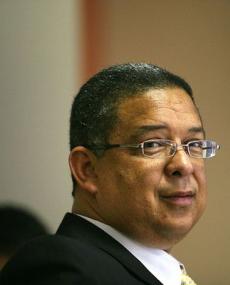
Robert John McBride was born on 6 July 1963 at the segregated Addington Hospital in Durban, Natal (now KwaZulu-Natal), in the section set aside for Coloured people. His parents were schoolteachers. His maternal grandparents were a White Afrikaner bus driver from the rural village of Harding in southern Natal, and a Coloured daughter of a Zulu-speaking mother and a Coloured father. Robert grew up in Wentworth, a suburb 11km from the city centre of the coastal, colonial city of Durban. Wentworth was a converted World War 2 military transit camp that was reserved for Coloured people only by the apartheid social planners. The industrial area of Jacobs and an oil refinery flanks it.
Robert enjoyed and had a particular talent for rugby, karate and later boxing, and was taught martial arts by his father. This tuition was initiated after a beating received by a much older boy, in a neighbourhood with many gangs. He grew more aggressive, becoming embroiled in many fights, but never joined a gang, largely because of the discipline of his parents. When 13, he was arrested for challenging the police beating of a youth. When older, while walking an employee home at night, he killed an attacker with his mother's pistol.
Politicised from an early age, first under the influence of his embittered father and then of friends, Robert found two books particularly influential. The first was A. J. Venter’s Coloured: A profile of 2 million South Africans, an unusually progressive book for its time which highlights the contribution of Coloured people in the struggle against apartheid, some of whom went into exile and chose violent resistance. It introduced McBride to Coloured political activists such as James April, Don Mattera, Jakes Gerwel, Basil February and his own uncle, Rev. Clive McBride. The second book Soledad Brothers - the prison letters of George Jackson, about an African-American associated with the Black Panther movement, became one of the most influential books McBride ever read. Through it he realized that he could physically fight for his liberation. Through a friend, Robert was introduced to the politics of a regenerating trade union movement, Black Consciousness (including the writing of Steve Biko) and the Frelimo independence movement in Mozambique. McBride matriculated at Fairvale High School in Wentworth.
He dropped out of Mechanical Engineering after one semester at the University of Natal and continued working in his father’s welding workshop, after which he briefly did shift work at the nearby docks. He then worked as an instrument fitter for the oil parastatal Sasol at its Secunda plant in the eastern Transvaal. There he met Thomas Matjeke a trade unionist who talked of the ANC and Frelimo. In 1983 McBride began at Bechet, a (Coloured) Teacher Training College, was elected to the Student's representative Council the same year, and helped form the Bechet branch of the Azanian Students' Organisation (AZASO), a student wing of the United Democratic Front (UDF). Here he met Vincent James, active in the Congress of South African Students (COSAS). It was during this time that he decided that armed struggle was the only way for him to meaningfully contribute to the liberation struggle in South Africa.
In 1984 sabotage was attempted on the oil refinery near the home of the young Robert McBride. Rocket-propelled grenades are used by cadres of uMkhonto we Sizwe (MK), the ANC's military wing. McBride was subsequently recruited into the ANC and were it not for his larger than life character, may have lived a clandestine life path similar to those of many young MK activists and exiles.
He went on to command the cell which caused the bloody destruction of the ‘Why Not’ Bar on Durban’s beachfront, which became known as the Magoo’s Bar bombing. This act of war where civilians were killed and injured still stands for many White South Africans as a reason for withholding forgiveness and reconciliation. McBride became renowned in underground circles for his fearless, tough and soldierly commitment. In 1986, in a daring operation he freed his wounded MK commander in a shootout with police guards at Edendale hospital.
McBride was captured and convicted for the Durban bombing and was eventually reprieved while on death row. On release from prison, he worked on the peace desk of the African National Congress in the PWV region. As with many across the political spectrum involved in the Witwatersrand peace structures, McBride met with representatives of former enemy organisations to do the hard work of creating and sustaining a fragile peace. He was later granted amnesty at the Truth and Reconciliation Commission after the full disclosure of his anti-apartheid actions of violence.
Mcbride married Paula Leyden while still on death row, but has subsequently separated. He lives in Johannesburg where he served as the Ekurhuleni Police Commissioner.